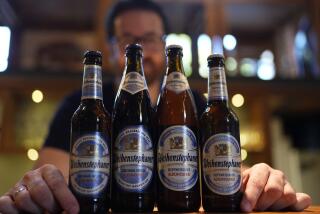German beer drinking declines
- Share via
BERLIN — Germany and beer go together like Porsches and the autobahn, but health-conscious residents are turning from the country’s traditional beverage in favor of juices and bottled water, sending suds sales down to the lowest levels in 15 years.
According to a government report released last Tuesday, the amount of beer sold in Germany fell to the lowest point since 1993 -- dropping 2.7% last year to 22 billion pints.
The Federal Statistics Office said the drop in beer sales came as the demand for soft drinks, other nonalcoholic beverages and beer mixed with fruit juices rose 18.1% last year, with some 887 million pints consumed by thirsty buyers.
Beer consumption in Germany has been falling steadily for more than a decade, a trend that experts have attributed to an increasingly health-conscious public and an aging population that is less likely to binge.
For last year’s decline, the German Brewers Assn. blamed a rainy summer, noting that foul weather damps the mood for lifting a stein on a summer evening.
But the group also pointed to shifting tastes.
“Our regular customers are getting older and don’t drink as much anymore, and generally Germans prefer milder tastes today, and are more health-conscious,” spokesman Marc-Oliver Huhnholz said.
For the country’s remaining beer drinkers, there’s more scary news: Their beloved beverage -- often called “liquid bread” because it is a basic ingredient of many Germans’ daily diet -- is getting more expensive.
Some breweries have already raised prices, and many others say they will follow later this year.
The director of the famous Hofbrauhaus beer hall in Munich said the brewery would increase its prices by about 74 cents per case in April.
“This is not about profit, it’s about cost increase,” Michael Moeller said, adding that the raw materials for the national beverage -- barley malt and hops -- have been getting more expensive.
Germany trails the Czech Republic for the top spot in per-capita consumption of beer.
More to Read
Sign up for Essential California
The most important California stories and recommendations in your inbox every morning.
You may occasionally receive promotional content from the Los Angeles Times.










